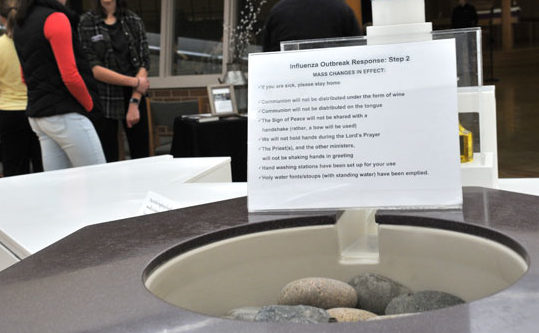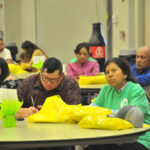
Signage for step two of the diocesan flu policy sits atop an empty font at Newman Catholic Student Center in Iowa City.
DES MOINES — The Iowa Department of Public Health (IDPH) has been notified of one additional positive case of an Iowan with COVID-19, for a total of 18 positive cases, Iowa Gov. Kim Reynolds said March 14 during a news conference. The individual is an older adult age 61-80, and a resident of Dallas County.
Additionally, IDPH has determined, based on the new COVID-19 case and the announcement this evening of community spread in Omaha, Neb., there is now community spread in our state.
Community spread occurs when individuals have been infected with the virus in an area and cannot specifically identify the source of the infection, or do not know how or where they became infected.
Due to the detection of community spread, new recommendations have been issued for individuals with underlying conditions, and all Iowans should be prepared for cancellations and disruptions in routine activities.
Mitigation measures should be implemented immediately to have the most significant impact on slowing the spread of the virus.
Leaders of institutions and organizers of events should begin to act on their contingency plans related to large gatherings, including church services. Iowans should not hold or attend large gatherings of more than 250 people, and consider making adjustments for smaller gatherings with high risk groups.
Health care organizations should also review their contingency plans and consider how telehealth can support the needs of Iowans.
At this time, school closures are not recommended. Gov. Reynolds referred to Centers for Disease Control and Prevention guidelines:
If a school has a positive case in a student, faculty member or visitor, we recommend a short-term suspension of a few days for cleaning to mitigate spread of the virus.
If there is significant absenteeism of staff and students, they should consider a short to medium length suspension of 2 to 4 weeks.
For substantial community spread, longer suspensions of 4 to 8 weeks or more are recommended.
Iowans should do their part to protect their health and the health of others:
Individuals 60 years of age and older with underlying conditions should stay at home and avoid gatherings or other situations of potential exposures, including travel to affected areas.
Consider personal social distancing measures: avoid large gatherings, limit the number of attendees per gathering. Consider working remotely or online learning when possible. Encourage staff to telework (when feasible), particularly individuals at increased risk of severe illness. Limit non-essential work travel and gatherings.
Follow CDC guidance regarding school closures if a school-based case is identified, implement short term suspension for school cleaning and contact tracing, and alter schedules to reduce student mixing. Cancel extracurricular activities as needed.
A public hotline has been established for Iowans with questions about COVID-19. The line is available 24/7 by calling 2-1-1 or 1-800-244-7431.
State agencies are taking the following steps:
The Iowa Department of Public Health encourages long-term care facilities to align their practices with recent guidance issued by the Centers for Medicare and Medicaid Services which limits non-essential visitors to long term care facilities. In addition, IDPH is requesting that long term care facilities report to the department when greater than two staff or residents are ill with respiratory symptoms without another diagnosis.
The IDPH further encourages long-term care facilities to implement additional visitor limitation protocols as deemed necessary to protect the life and safety of their residents.
Iowa Veterans Home announced it is restricting all visitors to both residents and staff in accordance with new national guidelines for nursing homes from the Centers for Medicare and Medicaid Services (CMS). Only Iowa Veterans Home staff will be allowed access, and all staff will be screened prior to entering.
Similarly, the Iowa Department of Human Services (DHS) suspended all in-person visitation for their six state-run facilities to prevent risk to the individuals served and to mitigate against community-spread. DHS will consider limited exceptions and is offering virtual options to allow continued communication with loved ones.
In addition, DHS is putting policies in place to ensure access to childcare during this time, including financial and operational assistance. These include paying child care providers based on enrollment rather than attendance, and expediting licensing to enable increasing capacity. Childcare inspection and regulatory functions will shift to provide technical assistance focused on hygiene and sanitation. DHS also recognizes the stress that emergency events cause children and families and are developing strategies to identify and address their needs.
Iowans can help prevent the spread of illness by following simple daily precautions including washing hands frequently, covering coughs and sneezes, and staying home when ill. It is currently flu and respiratory disease season, and IDPH recommends getting the flu vaccine.
Influenza activity is widespread in Iowa and as long as flu viruses are circulating, it’s not too late to receive the vaccine.
COVID-19 was first linked to an outbreak in Wuhan, China, but cases have subsequently been identified in several countries, including the U.S. Symptoms of COVID-19 include fever, cough and shortness of breath. Those most at risk of the virus are older adults, and individuals with underlying health conditions.
The House and Senate will convene March 16 to consider resolutions regarding continuity of government to ensure delivery of essential services to Iowans.
The Capitol building will open March 16 at 11 a.m., with entrances open on the south and west sides.
Members of the public over the age of 60 or with underlying health conditions (heart disease, diabetes, and lung disease) are encouraged to avoid the Capitol.











